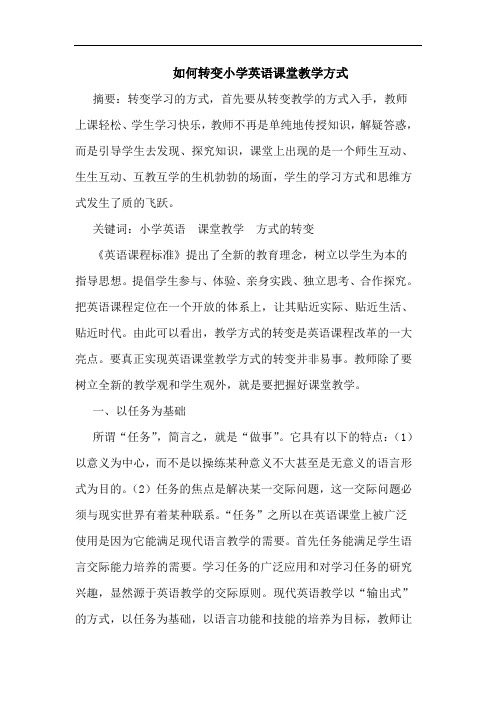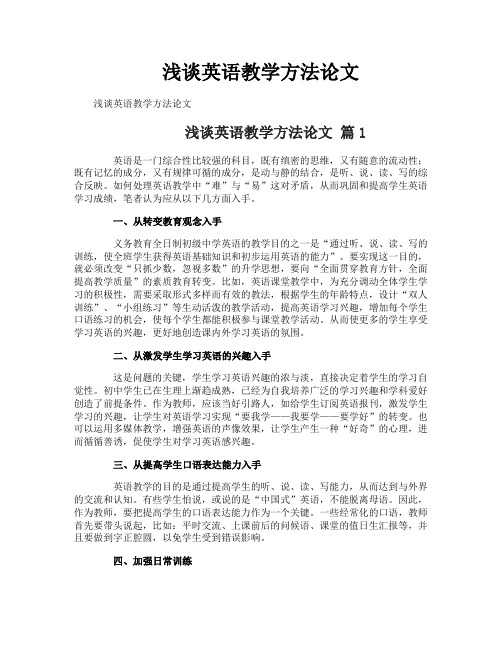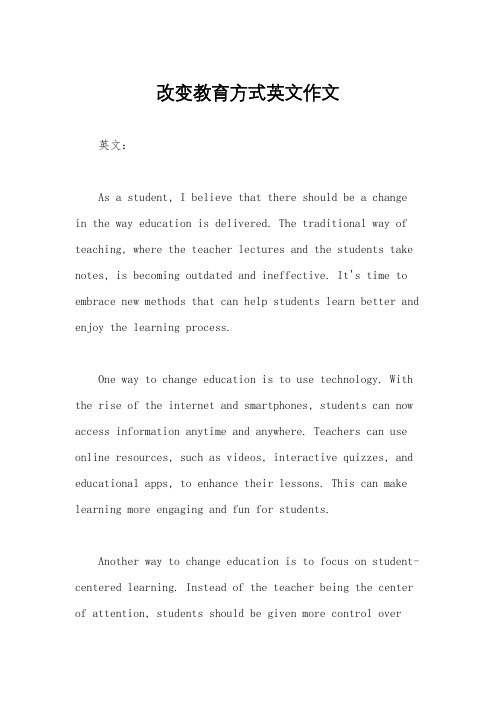改变英语教学方式,转变教学理念论文
英语作文教育方式的改变范文

英语作文教育方式的改变1In recent years, there has been a significant shift in the approach to English composition education. The traditional methods have revealed several shortcomings that cannot be ignored.Traditionally, the focus has been predominantly on grammar, often at the expense of expression and thinking skills training. This has led to students' writings lacking creativity and individuality. For instance, many students merely string together grammatically correct sentences without offering any unique perspectives or original ideas. The result is a collection of monotonous and formulaic essays.Moreover, the teaching methods have been rather monotonous. Lectures and repetitive exercises have dominated the classroom, dampening students' enthusiasm for learning. This one-size-fits-all approach fails to consider the diverse learning styles and needs of students.Consequently, the changing educational landscape now emphasizes fostering students' creativity and critical thinking. Encouraging them to express their thoughts freely and develop their own writing styles is of paramount importance. Teachers are now exploring more interactive and engaging teaching methods, such as group discussions and real-life writing scenarios. This not only boosts students' interest but also equips them with the necessary skills to communicate effectively in the Englishlanguage.Only through such a transformation can we truly prepare students to excel in English composition and meet the demands of the modern world.2In recent years, there have been remarkable changes in the way English composition is taught. Modern educational approaches have brought numerous advantages, revolutionizing the learning experience for students.The introduction of multimedia teaching has been a game-changer. For instance, watching English movies not only entertains students but also enhances their perception of language and cultural nuances, thereby improving their writing skills. The vivid scenes and authentic dialogues provide rich materials for students to draw inspiration from and expand their vocabulary.Another significant advancement is the utilization of online writing platforms. These platforms allow students to share their compositions, receive feedback from peers, and learn from each other's strengths and weaknesses. Through this interactive process, students become more motivated and engaged in the writing process.These modern methods have successfully ignited students' enthusiasm for English composition. They encourage creativity, critical thinking, and collaborative learning, which were often lacking in traditional teaching methods. By embracing these changes, we are providing students with amore dynamic and effective learning environment, enabling them to express themselves more freely and accurately in English writing.3In recent years, there have been significant changes in the way English composition is taught. In the past, a one-size-fits-all approach was often adopted, where all students were given the same writing tasks and instructions regardless of their individual levels and needs. However, this traditional method has proven to be ineffective as it fails to take into account the diverse abilities and interests of students.Nowadays, personalized teaching is emerging as a promising direction for English composition education. For instance, for students with a lower proficiency level, simpler and more structured writing tasks can be assigned to help them build a solid foundation. Meanwhile, for advanced students, more complex and challenging topics can be provided to stimulate their critical thinking and creativity.Another aspect of this change is tailoring writing themes based on students' interests. If a student is passionate about music, they could be asked to write an essay about the influence of music on people's lives. This not only enhances students' enthusiasm for writing but also allows them to express their thoughts and feelings more freely.In the future, I believe that the development of English composition education will continue to focus on customization and personalization.Educators will increasingly utilize advanced technologies to assess students' strengths and weaknesses accurately and design individualized learning plans accordingly. By doing so, we can expect to see a remarkable improvement in students' writing skills and a greater enjoyment of the learning process.4In recent years, there have been significant changes in the way English composition is taught. This transformation is driven by various factors, primarily the alteration in social demands and the update of educational concepts.The increase in international communication has raised the bar for the practicality of English writing. As the world becomes more interconnected, the ability to express thoughts clearly and accurately in English is no longer a luxury but a necessity. For instance, in business settings, precise and effective communication in English is crucial for successful transactions and partnerships.New educational theories have also played a vital role in reforming the teaching methods. The focus has shifted from rote learning to fostering creativity and critical thinking. Students are encouraged to think independently, express their unique viewpoints, and develop a personal style in writing.Moreover, the advancement of technology has brought about newteaching tools and resources. Online platforms and educational software provide diverse materials and interactive learning experiences, enabling students to practice and improve their writing skills in a more engaging manner.In conclusion, the changes in English composition education are a response to the evolving needs of society and the progress of educational thought. By adapting to these changes, we can better prepare students for the challenges and opportunities of the future.5In recent years, the changes in the educational methods of English composition have had a profound impact on both students and educational institutions. The shift from traditional teaching approaches to more innovative and student-centered ones has brought about remarkable benefits.For students, it has significantly enhanced their comprehensive English abilities. Instead of merely memorizing grammar rules and vocabulary, they are now encouraged to think critically and express themselves freely. This new approach has enabled many students to perform exceptionally well in English competitions. For instance, a student who was once struggling with writing could now effortlessly construct coherent and persuasive essays, winning top prizes in a regional contest.For schools, the adoption of innovative educational methods hasgreatly improved the quality of education and enhanced their reputation. Schools that have embraced modern teaching techniques have seen a rise in their students' overall academic performance. As a result, they have gained recognition and become models in the field of education.In conclusion, the changes in English composition education have been a driving force for progress. They have not only nurtured students' language skills but also elevated the standards of education as a whole, opening up new horizons for future generations.。
新课改下英语教师应如何调整教学观念论文

新课改下英语教师应如何调整教学观念摘要:随着新课改的推广,教师要对语文教学中有全新的认识,课堂教学中要充分发挥学生的主动性,课堂上要注意营造语言环境,更快掌握英语的应用,构建师生之间的和谐关系,唤醒学生的智慧。
关键词:语言环境和谐关系(一)重新认识英语教学,发挥学生的主动性改变以往的“以教师为中心”的教学方式。
新课标倡导“要构建自主、开放、探究的学习方式”,“教学是学生、教师、文本之间的对话的过程”等这些富有时代特征、与时俱进的教学理念。
这就要求我们教师,在教学中树立学生是教学主体的思想。
教学的参与者是教师和学生,其中学生应为主角。
在对话的过程中,师生不仅是平等的,而且应凸现学生主体的地位。
在课堂中,教师首先是参与者,与学生平等交流,其次才是组织者、引导者、促进者。
课堂是学生主动学习的场所,学生应畅所欲言,自主互动,让学生充分地说出他们的所思、所想、所感、所悟、所疑、所惑。
问题让他们去提,问题让他们去议,答案让他们去辩,结论让他们去得。
只有这样,学生才会享受到学习的乐趣,获得成功的喜悦。
这才是新课程下充满生命活力的新课堂。
今后的语文教师,不应是“授之与鱼”,终年辛劳而收效甚微的塾师,而应是“授之与渔”,教导孩子拥抱生活,在游泳中学会游泳的教练,是引导学生学会学习,使英语素养得到全面提高的智者。
作为人师,我们都有这样的切身感受:学生喜欢哪位教师,也就喜欢哪位老师的课,即所谓的“亲其师,信其道”。
这也足以说明学生在学习时,最乐意接受自己喜欢的、感兴趣的内容,甚至“爱屋及乌”。
学生若具有了问题意识,就会主动地发现和提出问题,并且具有解决问题的强烈动机,然后积极主动地进行探究,充分发挥学生的独立性、能动性、创造性。
由于学生提出的问题是自己经过观察分析发现的,是学生自己感兴趣的,因而他们具有极强的求知欲,具有较强的解决问题的内在动力,而不是外界强加的或逼迫的,所以学生学习的积极性很高。
并且能够持久地自觉地学习,从而充分发挥学生的主动性和能动性,进而发挥学生装的主体性,(二)营造英语学习的气氛,更快的融入国际化生活语言是一种交际工具,有它的社会性和广泛性,只有人人接受,人人适用,才有生存的可能。
怎样转变小学英语课堂教学方式论文

如何转变小学英语课堂教学方式摘要:转变学习的方式,首先要从转变教学的方式入手,教师上课轻松、学生学习快乐,教师不再是单纯地传授知识,解疑答惑,而是引导学生去发现、探究知识,课堂上出现的是一个师生互动、生生互动、互教互学的生机勃勃的场面,学生的学习方式和思维方式发生了质的飞跃。
关键词:小学英语课堂教学方式的转变《英语课程标准》提出了全新的教育理念,树立以学生为本的指导思想。
提倡学生参与、体验、亲身实践、独立思考、合作探究。
把英语课程定位在一个开放的体系上,让其贴近实际、贴近生活、贴近时代。
由此可以看出,教学方式的转变是英语课程改革的一大亮点。
要真正实现英语课堂教学方式的转变并非易事。
教师除了要树立全新的教学观和学生观外,就是要把握好课堂教学。
一、以任务为基础所谓“任务”,简言之,就是“做事”。
它具有以下的特点:(1)以意义为中心,而不是以操练某种意义不大甚至是无意义的语言形式为目的。
(2)任务的焦点是解决某一交际问题,这一交际问题必须与现实世界有着某种联系。
“任务”之所以在英语课堂上被广泛使用是因为它能满足现代语言教学的需要。
首先任务能满足学生语言交际能力培养的需要。
学习任务的广泛应用和对学习任务的研究兴趣,显然源于英语教学的交际原则。
现代英语教学以“输出式”的方式,以任务为基础,以语言功能和技能的培养为目标,教师让学生设计出个人信息卡,然后要求学生用所学语言知识表达个人喜好,与同学交流。
很显然,学生在完成任务的过程中,注意力集中在意义而不是集中在语言的形式上,自然、有意义地增进目的语的习得,增强了语言的实际运用能力。
其次,任务能进一步激发学生的学习兴趣。
师生进入课堂的目的从某种角度来看有差别。
教师主要目的是让学生掌握尽可能多的知识与技能,而学生的目的更多在于寻找一种快乐,游戏、唱歌等活动会让他们兴奋不已。
因此,教师在课堂上教什么并不等于学生学到了什么,教师的主要作用是如何在课堂教学中创造一种有利于学生外语习得的条件。
浅谈英语教学方法论文

浅谈英语教学方法论文浅谈英语教学方法论文浅谈英语教学方法论文篇1英语是一门综合性比较强的科目,既有缜密的思维,又有随意的流动性;既有记忆的成分,又有规律可循的成分,是动与静的结合,是听、说、读、写的综合反映。
如何处理英语教学中“难”与“易”这对矛盾,从而巩固和提高学生英语学习成绩,笔者认为应从以下几方面入手。
一、从转变教育观念入手义务教育全日制初级中学英语的教学目的之一是“通过听、说、读、写的训练,使全班学生获得英语基础知识和初步运用英语的能力”。
要实现这一目的,就必须改变“只抓少数,忽视多数”的升学思想,要向“全面贯穿教育方针,全面提高教学质量”的素质教育转变。
比如,英语课堂教学中,为充分调动全体学生学习的积极性,需要采取形式多样而有效的教法,根据学生的年龄特点,设计“双人训练”、“小组练习”等生动活泼的教学活动,提高英语学习兴趣,增加每个学生口语练习的机会,使每个学生都能积极参与课堂教学活动。
从而使更多的学生享受学习英语的兴趣,更好地创造课内外学习英语的氛围。
二、从激发学生学习英语的兴趣入手这是问题的关键,学生学习英语兴趣的浓与淡,直接决定着学生的学习自觉性。
初中学生已在生理上渐趋成熟,已经为自我培养广泛的学习兴趣和学科爱好创造了前提条件。
作为教师,应该当好引路人,如给学生订阅英语报刊,激发学生学习的兴趣,让学生对英语学习实现“要我学——我要学——要学好”的转变。
也可以运用多媒体教学,增强英语的声像效果,让学生产生一种“好奇”的心理,进而循循善诱,促使学生对学习英语感兴趣。
三、从提高学生口语表达能力入手英语教学的目的是通过提高学生的听、说、读、写能力,从而达到与外界的交流和认知。
有些学生怕说,或说的是“中国式”英语,不能脱离母语。
因此,作为教师,要把提高学生的口语表达能力作为一个关键。
一些经常化的口语,教师首先要带头说起,比如:平时交流、上课前后的问候语、课堂的值日生汇报等,并且要做到字正腔圆,以免学生受到错误影响。
教育方式变革英文作文

教育方式变革英文作文英文:Education is a fundamental part of our lives, and it plays a crucial role in shaping our future. As the world is constantly evolving, the traditional methods of education may not be sufficient to prepare students for the challenges of the 21st century. Therefore, it is essential to reform the way we educate our future generations.One way to reform education is to incorporate more practical and hands-on learning experiences. Instead of solely relying on textbooks and lectures, students should have the opportunity to apply their knowledge in real-life situations. For example, in science classes, students can conduct experiments and analyze data to understandscientific concepts better. This approach not only enhances students' understanding but also fosters critical thinking and problem-solving skills.Another aspect of education reform is the integrationof technology in the classroom. With the advancement of technology, students should be equipped with digitalliteracy skills to thrive in the modern world. By incorporating educational apps, online resources, and interactive learning platforms, students can have a more engaging and personalized learning experience. For instance, language learning can be enhanced through language learning apps that provide interactive exercises and real-time feedback.Furthermore, a shift towards a more student-centered approach to learning is crucial. Instead of a one-size-fits-all teaching method, educators should recognize and accommodate the diverse learning styles and needs of students. This can be achieved through differentiated instruction, project-based learning, and collaborativegroup work. By catering to individual strengths and interests, students are more likely to be motivated and engaged in their learning journey.In addition, the assessment methods should also bereformed to focus on the holistic development of students. Instead of solely relying on standardized tests, students' creativity, critical thinking, and soft skills should be evaluated. For instance, performance-based assessments, portfolios, and presentations can provide a more comprehensive understanding of students' abilities and progress.Overall, education reform is essential to meet the demands of the 21st century. By embracing practical learning experiences, integrating technology, adopting a student-centered approach, and redefining assessment methods, we can better prepare students for the complexities of the modern world.中文:教育是我们生活中基本的一部分,它在塑造我们未来方面起着至关重要的作用。
更新课程观念,改变教学方法(中学英语教学论文)

更新课程观念,改变教学方法 (中学英语教学论文)一.围绕学生,注意情感交流1.重视思想教育培养学生的自主学习能力是一项艰巨的任务,因为长期以来学生已习惯于老师满堂灌,一切听从老师安排的被动学习。
让学生自己去看、去预习,开始学生会很不习惯,甚至认为这些都不是作业。
这种现象会很普遍,但也很正常。
此时教师千万不可急躁行事。
一方面教师要有适当的措施以保证学生自主学习活动的开展。
同时要热情关心引导。
课后也要经常去教室了解学生在预习中的困难,帮助他们一起克服。
必须让学生感受到老师的热忱和对教学工作强烈的责任感。
师生间一旦建立起良好的情感基础,学生对老师的严格要求就容易接受,不会产生对立情绪。
平时不仅要对学生进行学习上的指导,还需让学生明白学好英语的目的意义。
大到全民英语素质的提高与我们国家信息技术发展的关系,小到个人就业、继续深造与英语学习间的关系。
同时毕业学生从大学反馈过来的信息,英语在大学中的地位,都可以作为教育的内容。
让学生通过实例去感受英语在当今社会中是何等重要。
学生一旦学习目的明确,学习积极性和自觉性必然大大提高。
2.注意方法指导引导学生自主学习,在初始阶段要特别注意方法指导。
要教会学生正确使用课本参考书、查阅词典和做预习笔记。
还要教会学生利用报刊、电脑上网收集有关材料。
在指导学生正确使用参考书和查阅词典的同时,还应指导学生学会选择恰当的,适合他们学习的参考书和词典。
在学习方法上要让学生学会巧记和联想。
如何背单词、如何对待练习中的错误,这些都是学生在学习英语时常见的问题。
老师必须耐心指导。
在学习中要让学生学会发现规律和寻找规律,并运用这些规律进行有效学习。
尽管在高考中无法体现学生的这些能力,但如果学生具备这些能力,那么学习上一定会起到事半功倍的效果。
3.激发学习兴趣激发学生学习兴趣,调动学生学习积极性首先必须是要指导学生拥有科学的学习方法和良好的学习习惯。
只有在学生能进行有效学习,能够不断感受成功喜悦的时候才那真正激发起他们的学习兴趣和学习积极性。
转变英语课堂教学方式论文

转变英语课堂教学方式一、教学背景小学英语教学内容更多的是以日常交流语言为主,带有很强的情境性,而小学的孩子注意稳定性较差,这就要求我们依据小学生英语新课程标准所提出的总目标以及本教材的特点,从学生已有的实际知识水平和生活经验出发,让学生主动探究,从而让学生自己去发现问题,进而解决问题,注重学生语言运用能力培养,注重讲授过程中的趣味性和文化意识,让学生学会学习,开发自主学习能力,发展学习策略,培养创新能力。
作为一名英语教师,如何依据新课改的精神,遵循《英语课程标准》,针对部分儿童外语口语交际能力薄弱的现状,使学生生动活泼,积极主动地得到发展,找到符合学生身心发展特点和教育规律的方法,成为提高小学生英语水平及交际性语言的重要一步。
二、教材分析这是清华大学编写的小学英语教材3a unit2 lesson8的内容。
本课时的教学内容贴近学生生活和学习实际并配有生动、活泼、富有情趣的插图,有利于学生在比较接近于实际的情景中进行听说训练,从而激发学习的兴趣,增强学习英语的信心,在课堂上营造生活中的情景,使课堂生活化,贴近学生的生活,让学生在自己熟悉的环境中探究新知,为以后的学习打下坚实的基础。
帮助学生养成良好的学习习惯,为进一步学习打下基础,体验到学的快乐。
三、教学对象的说明学生已学习英语口语,对一些简单的英语游戏活动等学习形式已经熟悉,学习兴趣较浓,积极性较高,通过出示实物,贴近学生生活,为了避免机械枯燥的学习,事先我让学生带好实物 book, ruler, banana ……水果,还有学生现成的文具,上课了,我先出示幻灯,让学生逐一读出单词,然后再用 i have___ 的句型,让学生举起所说的实物,最后进行听音乐传实物的游戏,音乐停时,实物再谁手中,谁就要说出实物名称。
这样,学生兴趣盎然,大大提高了学习效果。
四、教学实录step1. warm up1、学生用歌声来介绍自己,互相问候,建立氛围。
2、利用玩具娃娃 joy ,师生互相问候,激起兴趣,导入新课。
改变教育方式英文作文

改变教育方式英文作文英文:As a student, I believe that there should be a changein the way education is delivered. The traditional way of teaching, where the teacher lectures and the students take notes, is becoming outdated and ineffective. It's time to embrace new methods that can help students learn better and enjoy the learning process.One way to change education is to use technology. With the rise of the internet and smartphones, students can now access information anytime and anywhere. Teachers can use online resources, such as videos, interactive quizzes, and educational apps, to enhance their lessons. This can make learning more engaging and fun for students.Another way to change education is to focus on student-centered learning. Instead of the teacher being the center of attention, students should be given more control overtheir learning. This can be done through project-based learning, where students work on real-world problems and develop critical thinking skills. Teachers can act as facilitators, guiding students and providing feedback.In addition, it's important to recognize that every student learns differently. Some students may be visual learners, while others may be auditory learners. Teachers should use a variety of teaching methods to cater to different learning styles. For example, they can use diagrams, videos, and hands-on activities to help students understand complex concepts.In conclusion, there are many ways to change education for the better. By using technology, focusing on student-centered learning, and catering to different learning styles, we can create a more effective and enjoyable learning experience for students.中文:作为一名学生,我认为教育方式应该有所改变。
- 1、下载文档前请自行甄别文档内容的完整性,平台不提供额外的编辑、内容补充、找答案等附加服务。
- 2、"仅部分预览"的文档,不可在线预览部分如存在完整性等问题,可反馈申请退款(可完整预览的文档不适用该条件!)。
- 3、如文档侵犯您的权益,请联系客服反馈,我们会尽快为您处理(人工客服工作时间:9:00-18:30)。
改变英语教学方式,转变教学理念
新一轮的课程改革对农村学校英语教学的冲击是前所未有的。
新教材的编排分为以下几个部分:warming up,listening and speaking,reading,grammar and integrating skills.其内容丰富多彩,练习灵活多样,听力生动有趣,面对这些新颖组合,我们感到迷茫.而新课改的目标之一又是推动学生学习方式的改革,这就对我们教师提出了更高的要求.要求我们必须转变,必须从传统中走出来,尽快适应新课程,这是实施新课程的关键所在。
一、教师角色要转变:
在过去,教师是“统治者”,教师是“灵魂的工程师”,教师是“园丁”。
学生应该绝对服从教师,那怕是错的。
在过去,教师是课堂的主角,学生只能是认真听课,认真做笔记,认真回答老师所提出的每一个问题,而不能发表自己的见解。
而新课标的教师概念则完全不同。
新课标下的教师应该大胆向学生承认自己不懂的东西,请学生与自己一道解决教学中的疑难。
应该是一种平等的师生关系,让学生感到学习是一种平等的师生交流,是一种学习上的享受。
新课标要求教师不仅要成为学生的良师,还要成为益友。
新课标要求教师把课堂还给学生,教师不能做课堂的“统治者”,教师应该从传统的讲台上走下来与学生融为一体;与学生站在同一个平台上互动探讨。
教师应该推动学生学习而不是加压力,应该用鞭策,激励,赏识等手段来促进学生学习。
教师应该是“灵魂的铸造师”而不是“灵魂的工程师”。
二、改变英语教学方式,激发学生内心热情:
新课程内容灵活多样,丰富多彩,因此要求我们英语教师在教学过程中要运用多变的教学方式,随机应变,适当增减,提前推后。
所以我们在教新教材时,不要严格按照书本进程,可根据实际情况增减内容,可以把有些单元提前,也可以把某些单元延后,激发学生学习的兴趣。
为增加课堂氛围,可以采用多样的教学手段,如幻灯,多媒体等。
在教学过程中,教师应尽量用英语组织和进行教学,为学生提供浓厚的英语语言学习环境。
三、挖掘教材潜能,理解作者意图:
教材是实施教学行为的基础和依托,是教学的核心资源。
正确运用教材首先要弄清编写意图,新教材的编写,给老师提出了更高,更严的要求,如warming up这部分,看似只有几副图和几个问题,其实内容涉及相当广泛,包括天文地理,电视电影,诗歌文学,建筑艺术,环境保护,医疗卫生等古今中外,国际国内的知识,学生看后不知所措,这就要求教师课前要做好充分的准备,了解相关的背景,查阅大量的资料,进行必要的补充;启发学生思考有关话题,鼓励学生自由讨论,大胆发言。
又如grammar这部分,书上只是点到为止,这就要求教师课前系统备课:既要注重语法知识的讲解,又要准备大量的练习,还要权衡难易程度,总之,看似好教的新教材隐藏着让人难以想象的难度,因为新教材呈现出较大的弹性和开放度,教师要结合学情,灵活处理教材,进行整体化设计,“活化教材”是用教材而不是教教材。
因此我们教师要熟读教材,通读教
材,挖掘教材;理解作者意图,把握其重难点,掌握其考点。
四、转变教学理念,以促进学习方式的转变
教师要转变不利于教学的传统教学模式,打破以教师为中心的传授教学模式。
真正要用新教材根本在于教师转变教学观点,教师要把握新课标精神,改变“一言堂”的做法,要从单纯的重视语言知识的讲授转变到注重培养学生运用英语的能力;在教学中建立师生互动关系,和谐融洽和教学相长的新型师生关系。
教师不再作为知识的权威,而是学生学习的合作者与引导者。
新课标对课堂结构安排有了突破性的创新,我们应当根据学生身心发展规律和新课标来设计教学结构模式。
新课程倡导采用任务型教学模式来实施课堂教学,在教材中也处处体现了任务,完成任务的过程也就是学习的过程。
因此,课堂教学中设计的问题应明确,具体,有针对性,要巧妙地布置任务并有目的地引导学生,让他们在完成任务的过程中学到知识,提高技能。
在整个教学过程中都将置学生于学习的主体地位,让他们感到学习没有负担,让他们感到学习是完成任务的乐趣,从而主动地去学习。
五、教师要不断反思,提高教学能力
只注重前面几点是不够的,要想使我们的教学更完善,要想使我们自身的水平得到进一步的提高,教学反思是新型教师必不可少的一个环节。
教学反思是对我们教学工作的每一个环节进行重新认识和深层次的思考,是教学工作的重要组成部分。
教学反思可以帮助我们扬长避短,精益求精。
没有反思的教学仅仅是一种单调的重复。
我们要做到每一节课下来,静心沉思,教法上有那些创新,启发是否恰当,教学目的是否实现,教学任务是否完成等等。
我们要不断反思自己的教学行为,回顾并记录每一节课的心得体会,随时随地对自己的教学进行调整,才能使我们以后的教学更精彩,教学设计更完美。
总之,新课改带来了新教材,新教材呼唤新教法,新教法就要求教师转变教学观念。
在新课改的实施过程中,教师是关键,是执行者。
新课程需要新型教师,新课程对教师提出了新的要求。
也就是说,教师要成为学生学习成长的引导者,学生潜能的开发者,学生知识构建的促进者,教材的研究者和探索者。
我们要不断改变教学方法,转变教育观念;还要在教学中不断反思,才能摆脱传统教科书的束缚,成为新课标下新型教师的领航人。
